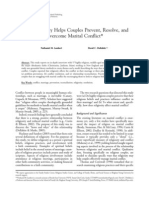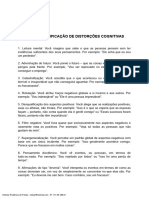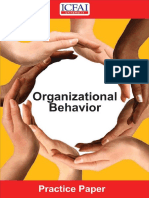Thinking Errors
Thinking Errors
Uploaded by
AnnaCopyright:
Available Formats
Thinking Errors
Thinking Errors
Uploaded by
AnnaOriginal Description:
Original Title
Copyright
Available Formats
Share this document
Did you find this document useful?
Is this content inappropriate?
Copyright:
Available Formats
Thinking Errors
Thinking Errors
Uploaded by
AnnaCopyright:
Available Formats
Thinking errors
Although some automatic thoughts are true,
many are either untrue or have just a grain of
truth. Typical mistakes in thinking include:
1. All-or-nothing thinking (also called black-and-white, polarized, or dichotomous
thinking): You view a situation in only two categories instead of on a
continuum. Example: “If I’m not a total success, I’m a failure.”
2. Catastrophizing (also called fortune-telling): You predict the future negatively
without considering other, more likely outcomes. Example: “I’ll be so upset, I
won’t be able to function at all.”
3. Disqualifying or discounting the positive: You unreasonably tell yourself that
positive experiences, deeds, or qualities do not count. Example: “I did that
project well, but that doesn’t mean I’m competent; I just got lucky.”
4. Emotional reasoning: You think something must be true because you “feel”
(actually believe) it so strongly, ignoring or discounting evidence to the
contrary. Example: “I know I do a lot of things okay at work, but I still feel like
I’m a failure.”
5. Labeling: You put a fixed, global label on yourself or others without considering
that the evidence might more reasonably lead to a less disastrous
conclusion. Example: “I’m a loser. He’s no good.”
6. Magnification/minimization: When you evaluate yourself, another person, or a
situation, you unreasonably magnify the negative and/or minimize the
positive. Example: “Getting a mediocre evaluation proves how inadequate I
am. Getting high marks doesn’t mean I’m smart.”
7. Mental filter (also called selective abstraction): You pay undue attention to one
negative detail instead of seeing the whole picture. Example: “Because I got
one low rating on my evaluation [which also contained several high ratings] it
means I’m doing a lousy job.”
8. Mind reading: You believe you know what others are thinking, failing to
consider other, more likely possibilities. Example: “He thinks that I don’t
know the first thing about this project.”
9. Overgeneralization: You make a sweeping negative conclusion that goes far
beyond the current situation. Example: “[Because I felt uncomfortable at the
meeting] I don’t have what it takes to make friends.”
10. Personalization: You believe others are behaving negatively because of you,
without considering more plausible explanations for their behavior. Example:
“The repairman was curt to me because I did something wrong.”
11. “Should” and “must” statements (also called imperatives): You have a precise,
fixed idea of how you or others should behave, and you overestimate how
bad it is that these expectations are not met. Example: “It’s terrible that I
made a mistake. I should always do my best.”
12. Tunnel vision: You only see the negative aspects of a situation. Example: “my
son’s teacher can’t do anything right. He’s critical and insensitive and lousy
at teaching.”
You might also like
- Alex Stitt - Accepting Gender - An ACT Workbook For Trans and Non-Binary People-Jessica Kingsley PubDocument210 pagesAlex Stitt - Accepting Gender - An ACT Workbook For Trans and Non-Binary People-Jessica Kingsley PubMayra CarolineNo ratings yet
- How To Do Things You Hate: Self-Discipline to Suffer Less, Embrace the Suck, and Achieve AnythingFrom EverandHow To Do Things You Hate: Self-Discipline to Suffer Less, Embrace the Suck, and Achieve AnythingRating: 5 out of 5 stars5/5 (3)
- Common Thinking TrapsDocument2 pagesCommon Thinking TrapsCBTNo ratings yet
- Cognitive DistortionsDocument63 pagesCognitive DistortionsSatya Revanth100% (6)
- Procrastination: Causes, Tips and Questionnaire CausesDocument6 pagesProcrastination: Causes, Tips and Questionnaire CausesCristina BAHNANo ratings yet
- Core BeliefsDocument4 pagesCore BeliefsJames StephensNo ratings yet
- Cognitive Distortions Handout (Revised Byui)Document2 pagesCognitive Distortions Handout (Revised Byui)api-291366747No ratings yet
- Improving Self-Esteem Module 4 of 9Document13 pagesImproving Self-Esteem Module 4 of 9valeria_kendall6388100% (1)
- Lambert:Dollahite ConflictDocument11 pagesLambert:Dollahite ConflictcatalinclaudiuNo ratings yet
- LabelingDocument2 pagesLabelingChristine AltamarinoNo ratings yet
- Common Unhelpful Thinking PattersDocument2 pagesCommon Unhelpful Thinking PattersNuno AlmeidaNo ratings yet
- Common Cognitive DistortionsDocument4 pagesCommon Cognitive DistortionsJanel SunflakesNo ratings yet
- The Common Mental MistakesDocument2 pagesThe Common Mental MistakesCraig KerleyNo ratings yet
- Ingles-Explicación Distorsiones CognitivasDocument5 pagesIngles-Explicación Distorsiones CognitivasAndrea BarberenaNo ratings yet
- Patterns of Cognitive DistortionsDocument6 pagesPatterns of Cognitive DistortionsBushra AwanNo ratings yet
- Testing Your Thoughts: Side One Worksheet: Cognitive DistortionsDocument2 pagesTesting Your Thoughts: Side One Worksheet: Cognitive DistortionsheveanNo ratings yet
- Week 02 Quarter 01Document7 pagesWeek 02 Quarter 01Dodalyn MananganNo ratings yet
- Definitions of Cognitive DistortionsDocument1 pageDefinitions of Cognitive Distortionsosman.s.boruteceneNo ratings yet
- Cognitive DistortionsDocument1 pageCognitive DistortionsJames Bank100% (1)
- Cognitive DistortionsDocument2 pagesCognitive DistortionsGomathi ShankarNo ratings yet
- Thinking Distortions: Someone Else's Limitations)Document1 pageThinking Distortions: Someone Else's Limitations)Courtney ViceNo ratings yet
- Equivalent: Jumping To ConclusionsDocument3 pagesEquivalent: Jumping To ConclusionsB TamulyNo ratings yet
- Cognitive DistortionsDocument3 pagesCognitive Distortionsmsreginaphalange100% (1)
- Recognise Your Negative Thinking PatternsDocument2 pagesRecognise Your Negative Thinking PatternsNathanNo ratings yet
- Worksheet - Stopping Stupid ThoughtsDocument2 pagesWorksheet - Stopping Stupid ThoughtsIlias KolokourisNo ratings yet
- Definitions of Cognitive DistortionsDocument2 pagesDefinitions of Cognitive DistortionsReeti R. BhatNo ratings yet
- Common Unhelpful ThoughtsDocument3 pagesCommon Unhelpful ThoughtsHazal KhanNo ratings yet
- Cognitive DistortionsDocument1 pageCognitive DistortionsTransformNo ratings yet
- Cognitive Behavioral Therapy Cognitive DistortionsDocument1 pageCognitive Behavioral Therapy Cognitive DistortionsheveanNo ratings yet
- Coping With Depression: Judith S. Beck, PHDDocument7 pagesCoping With Depression: Judith S. Beck, PHDcarmen ponceNo ratings yet
- Cognitive Errors 25012021 014657pmDocument13 pagesCognitive Errors 25012021 014657pmhina rafiqNo ratings yet
- Challenging Negative Thoughts FillableDocument1 pageChallenging Negative Thoughts FillableharrietlyeNo ratings yet
- Typical Cognitive DistortionsDocument1 pageTypical Cognitive DistortionsKore RomeroNo ratings yet
- BK1 #BraveTams - Effectively Manage Your Thoughts, Feelings and BehaviorsDocument7 pagesBK1 #BraveTams - Effectively Manage Your Thoughts, Feelings and BehaviorsAnne Marieline BuenaventuraNo ratings yet
- Coping With Depression 2024Document7 pagesCoping With Depression 2024holaNo ratings yet
- Cognitive DistortionsDocument17 pagesCognitive DistortionsChaithanya ManojNo ratings yet
- Lists of Irrational ThoughtDocument4 pagesLists of Irrational ThoughtJovena Lim0% (1)
- Cognitive Distortion WDocument12 pagesCognitive Distortion Wselimbabu93No ratings yet
- 10 Distorted Thinking StylesDocument2 pages10 Distorted Thinking StyleskawekawekaweNo ratings yet
- Negative Automatic ThoughtsDocument7 pagesNegative Automatic ThoughtswiNo ratings yet
- Distorções CognitivasDocument4 pagesDistorções CognitivasHeloise F.No ratings yet
- Good Candidates For Psychoanalysis and Strategies For Correcting ThinkingDocument2 pagesGood Candidates For Psychoanalysis and Strategies For Correcting Thinkingapi-260339450No ratings yet
- Cognitive DistortionsDocument5 pagesCognitive Distortionsfrozenflameboy100% (1)
- Cognitive DistortionDocument5 pagesCognitive DistortionOzzyel CrowleyNo ratings yet
- 50 Common Cognitive DistortionsDocument9 pages50 Common Cognitive DistortionsMark KovalNo ratings yet
- CBT Skills in Practice WorkbookDocument11 pagesCBT Skills in Practice WorkbookHeb GibNo ratings yet
- Beck PDFDocument3 pagesBeck PDFpsychonomyNo ratings yet
- Notes On Aaron Beck and Cognitive Therapy PDFDocument3 pagesNotes On Aaron Beck and Cognitive Therapy PDFDiego Rojo100% (1)
- Notes On Cognitive Therapy PDFDocument3 pagesNotes On Cognitive Therapy PDFpsychonomyNo ratings yet
- CBT PTSD Selected HandoutsRevDocument13 pagesCBT PTSD Selected HandoutsRevSean ThomasNo ratings yet
- 11 Cognitive Distortions Identified in CBTDocument10 pages11 Cognitive Distortions Identified in CBTAnushka Ridhi HiraNo ratings yet
- Top 10 Thought DistortionsDocument3 pagesTop 10 Thought DistortionsHomitchi SorinaNo ratings yet
- Chapter 4 - Developing Critical Thinking SkillsDocument49 pagesChapter 4 - Developing Critical Thinking SkillsLalita A/P AnbarasenNo ratings yet
- Assertiveness (Full) Howard RokofskyDocument16 pagesAssertiveness (Full) Howard RokofskyhoweroNo ratings yet
- Are You a Positive or Negative ThinkerDocument7 pagesAre You a Positive or Negative ThinkerBlessing KagurabadzaNo ratings yet
- Common Cognitive Distortions of Addicts That Prevent Addiction RecoveryDocument20 pagesCommon Cognitive Distortions of Addicts That Prevent Addiction RecoveryEmilyNo ratings yet
- Cognitive Distortions HandoutDocument1 pageCognitive Distortions HandoutSabrine Bouleghraif100% (1)
- Cognitive Thinking ErrorsDocument7 pagesCognitive Thinking ErrorsjawairiyaNo ratings yet
- Peer Counsellors Training - 22-6-21Document2 pagesPeer Counsellors Training - 22-6-21BRITTANY STANLEYNo ratings yet
- Cognitive Distortions For TeensDocument5 pagesCognitive Distortions For TeenschristinelkimNo ratings yet
- Ambivilance As PerfectionismDocument2 pagesAmbivilance As PerfectionismdagmaichyNo ratings yet
- The Scout Mindset: Why Some People See Things Clearly and Others Don'tFrom EverandThe Scout Mindset: Why Some People See Things Clearly and Others Don'tRating: 4 out of 5 stars4/5 (68)
- Ancheta - A World Without EmotionsDocument3 pagesAncheta - A World Without EmotionsSOPHIA MARGARITA ANCHETANo ratings yet
- 1.1 Background of The ResearchDocument8 pages1.1 Background of The ResearchriezkyNo ratings yet
- Chapter - Four Communication in Organizations 4.1Document12 pagesChapter - Four Communication in Organizations 4.1YIBELTAL ANELEYNo ratings yet
- Public Health Administration and ManagementDocument68 pagesPublic Health Administration and ManagementRodel AgapitoNo ratings yet
- Culture and Psychology 1596823154Document401 pagesCulture and Psychology 1596823154JOANNA REAN SAGUIRELNo ratings yet
- How To Overcome ShameDocument2 pagesHow To Overcome ShameMas PramNo ratings yet
- (Advances in Creativity and Giftedness 10) Don Ambrose, Robert J. Sternberg (Eds.) - Giftedness and Talent in The 21st Century - Adapting To The Turbulence of Globalization (2016, SensePublishers)Document308 pages(Advances in Creativity and Giftedness 10) Don Ambrose, Robert J. Sternberg (Eds.) - Giftedness and Talent in The 21st Century - Adapting To The Turbulence of Globalization (2016, SensePublishers)Son PhungNo ratings yet
- New CVDocument3 pagesNew CVapi-269950290No ratings yet
- APA Referencing GuideDocument33 pagesAPA Referencing GuideWong Ka-YeeNo ratings yet
- 1 s2.0 S0260691718302107 MainDocument9 pages1 s2.0 S0260691718302107 MainYomira HuaisaraNo ratings yet
- Capgras SyndromeDocument4 pagesCapgras Syndromeapi-459379591No ratings yet
- Guzman, John Wayne T.an Assessment On The Vision and Goal of The University of Northern PhilippinesDocument2 pagesGuzman, John Wayne T.an Assessment On The Vision and Goal of The University of Northern PhilippinesGuzman T. John WayneNo ratings yet
- Stanislav GrofDocument7 pagesStanislav GrofIno MoxoNo ratings yet
- Strategic Brand Management PDFDocument6 pagesStrategic Brand Management PDFPraveen PraveenNo ratings yet
- ICFAI Organizational Behaviour Model QuestionsDocument25 pagesICFAI Organizational Behaviour Model QuestionsSrivani AlooruNo ratings yet
- Minding The Body The Body in Psychoanalysis and BeyondDocument56 pagesMinding The Body The Body in Psychoanalysis and Beyond曾慈鈞No ratings yet
- Bilingualism and Language Classroom: Powerpoint TemplatesDocument10 pagesBilingualism and Language Classroom: Powerpoint Templates芳凯100% (1)
- Introduction To HRMDocument5 pagesIntroduction To HRMShaon SalehinNo ratings yet
- Entrepreneurship Theory CMATking IE Bible 1Document4 pagesEntrepreneurship Theory CMATking IE Bible 1Ojaswi soniNo ratings yet
- Homeroom Guidance Quarter 2: Clarence A. BalmeoDocument5 pagesHomeroom Guidance Quarter 2: Clarence A. BalmeoClarence Abainza BalmeoNo ratings yet
- Selfharm in AdolescenceDocument11 pagesSelfharm in AdolescenceNordsci ConferenceNo ratings yet
- Fail (30-39%) - Example CW2 Assignment EssayDocument6 pagesFail (30-39%) - Example CW2 Assignment EssayFarazNo ratings yet
- AIG Case StudyDocument1 pageAIG Case StudyVishesh ShrivastavaNo ratings yet
- The Road To Character: IntroDocument3 pagesThe Road To Character: Introwamu885100% (1)
- Review Questions Rules of The GameDocument2 pagesReview Questions Rules of The Gamegaya friedmanNo ratings yet
- Session 1 - Overview On The DSWD WiSUPPORT ProgramDocument46 pagesSession 1 - Overview On The DSWD WiSUPPORT ProgramReimond RunezNo ratings yet
- Danielson Domains RubricDocument4 pagesDanielson Domains RubricMia mooreNo ratings yet
- Human Person As Oriented Towards Their Impending Death - 0Document13 pagesHuman Person As Oriented Towards Their Impending Death - 0leandro porroNo ratings yet

























































































